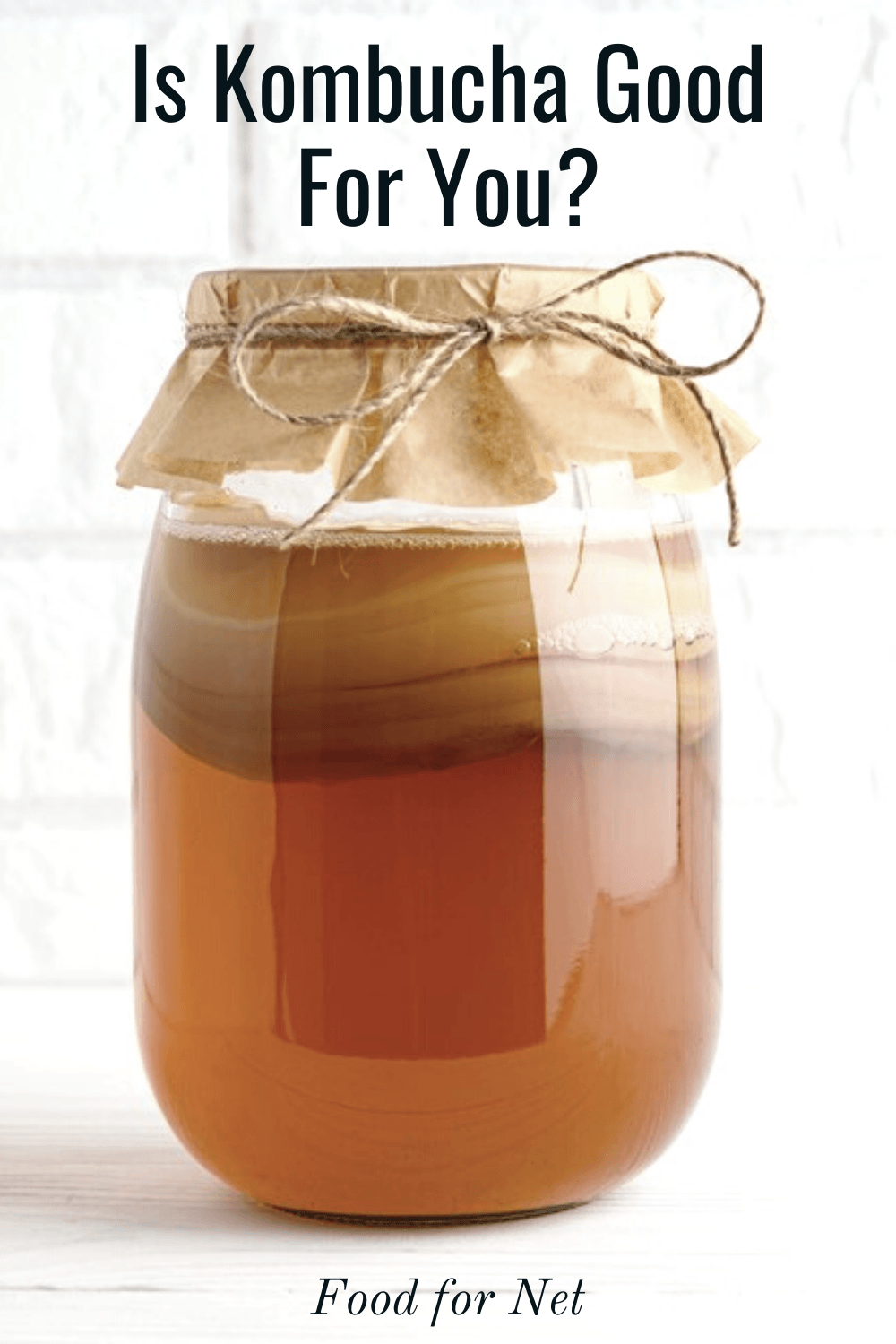
Kombucha has been making waves as a healthy drink. one that’s low in sugar and is packed with probiotics. Those probiotics are the most important part, as they help to support your gut health and we’re starting to realize just how important gut health is. You get the benefits of tea too, which just makes everything better. Yet, asking ‘is kombucha good for you?’ isn’t as strange as you might expect.
Like most foods and drinks, kombucha has some concerning effects as well as its positive ones. Kombucha could even be harmful in some situations.
Before we dig into the benefits and risks, let’s talk a little more about kombucha itself.
Kombucha is a fermented drink, often made from black or green tea. Various types of spice, fruit, or juice are sometimes added during the creation process to provide extra flavor. You can get some benefits from these additions too, although the main point of kombucha is the drink itself.
Kombucha is consumed cold and is slightly effervescent (which just means that it has small bubbles). It has a distinct sour flavor from the fermentation that is not easily masked by other ingredients. However, many people enjoy the sour taste and see kombucha as a delicious drink.
Is Kombucha Good For You?
- The Benefits Of Kombucha
- The Health Risks Of Kombucha
- How To Choose The Best Kombucha
- How Much Kombucha Should You Drink?
- How To Make Kombucha At Home
- Final Thoughts
The Benefits Of Kombucha
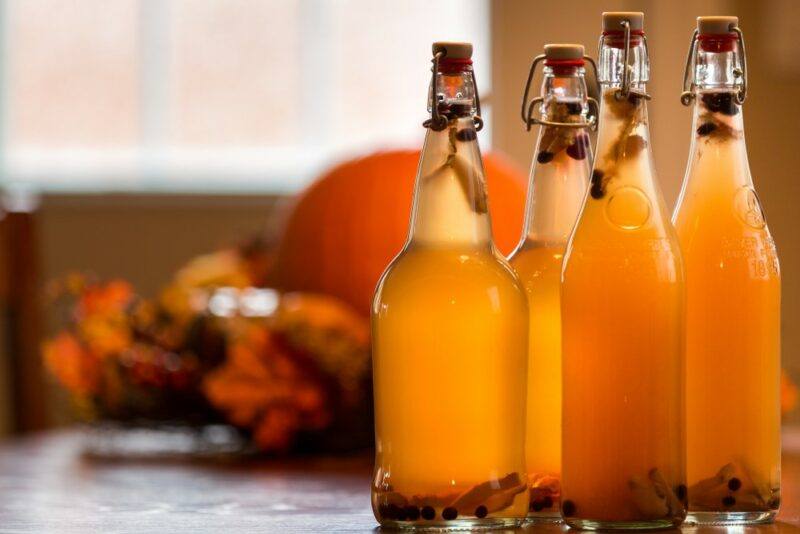
Improves Gut Health
Kombucha is considered a probiotic. This means it contains live cultures of beneficial bacteria, similar to the bacteria that is found in our gut.
Probiotics are thought to help with our balance of gut bacteria, giving us more good microbes, which then influence the rest of our body. In fact, our guts play a surprising number of roles, helping to support our immune system, improve the digestion of food, influence our weight, improve mental health, and much more.
Kombucha isn’t the only product to promote a healthy gut. There are plenty of other probiotic foods and drinks, along with prebiotic foods that help to feed our gut bacteria.
Kombucha isn’t necessarily more powerful than other types of probiotics either. However, it is relatively easy to make at home, which can make it a good choice.
Plus, if you want to optimize your health, it’s best to get probiotics from a variety of sources. This way you’re consuming many different types of beneficial bacteria and yeast, rather than large amounts of just a few species.
Doing so gives you a broad array of possible benefits while minimizing your risk.
Provides Compounds From Tea
Tea has plenty of benefits. It is a rich source of antioxidants and anti-inflammatory compounds, which can then support your health in a variety of ways.
In particular, drinking tea regularly may help with your blood sugar levels, weight loss, and cholesterol. Tea might even decrease your cancer risk and help you to live longer. Evidence for these benefits is somewhat mixed, but even if tea isn’t as powerful as all that, it’s clearly a healthy drink.
Kombucha is created by fermenting tea, so it retains many of those beneficial compounds. This should make it at least as good as tea for your health. It may even be better, as you have the compounds from tea and the probiotics all at the same time.
Kombucha made from green tea may be the best because green tea has more powerful antioxidants than black tea.
It May Kill Bacteria
The fermentation process that produces kombucha also gives you acetic acid. This is the same type of acid that’s found in vinegar and it has antibacterial properties.
Interestingly, these properties don’t appear to influence the beneficial bacteria in kombucha.
This area hasn’t been studied heavily, so we don’t know what the antibacterial effect means for human health. But, it could help your body to fight infection.
Can Help With Diabetes Management
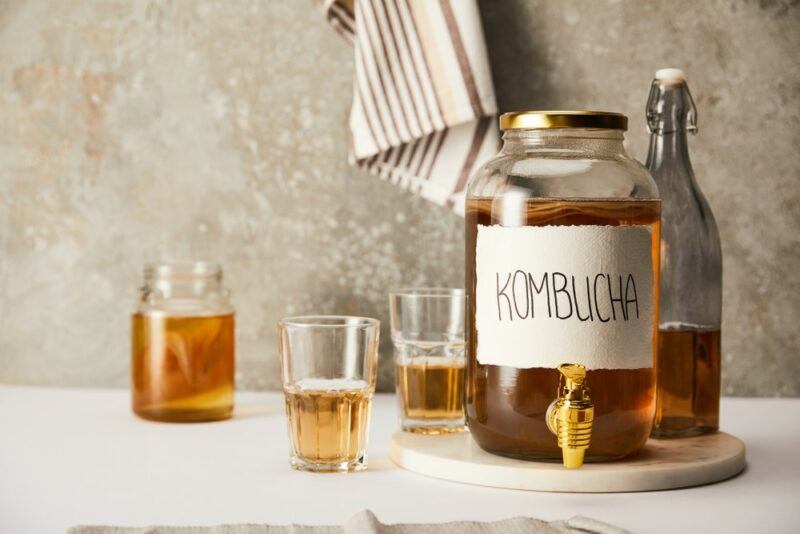
People with type 2 diabetes may see extra benefits from kombucha, as the drink has been linked to improvements in blood sugar levels. It may even help with your liver and kidney function, although this effect hasn’t been proven in humans.
Let’s not forget that tea, particularly green tea, may be helpful for diabetes too. This could make green tea kombucha the most powerful option.
There Can Be Nutrients Too
Kombucha may also provide a variety of nutrients, including amino acids, trace minerals, and vitamins, along with plant-based compounds.
You can increase the benefits by using spices when making kombucha. Spices like cinnamon don’t just provide extra flavor, they’ve also been linked to many health impacts of their own, like helping to control blood sugar.
Could Help With Joints
While evidence is limited, kombucha is thought to help with your joints as well. The effect partly comes from the antioxidants and anti-inflammatory compounds you get from the tea.
Kombucha also contains glucosamines, which may be relevant for reducing the risk of arthritis and even treating arthritis symptoms. There’s even a chance that kombucha’s impact on your gut health could lead to joint improvements as well.
While most of kombucha’s benefits haven’t been proven in humans, the drink can be low in calories and delicious. Those features are reason enough to drink kombucha regularly. You’re certainly getting more benefits than from ultra-processed products like Gatorade and Vitaminwater.
The Health Risks Of Kombucha
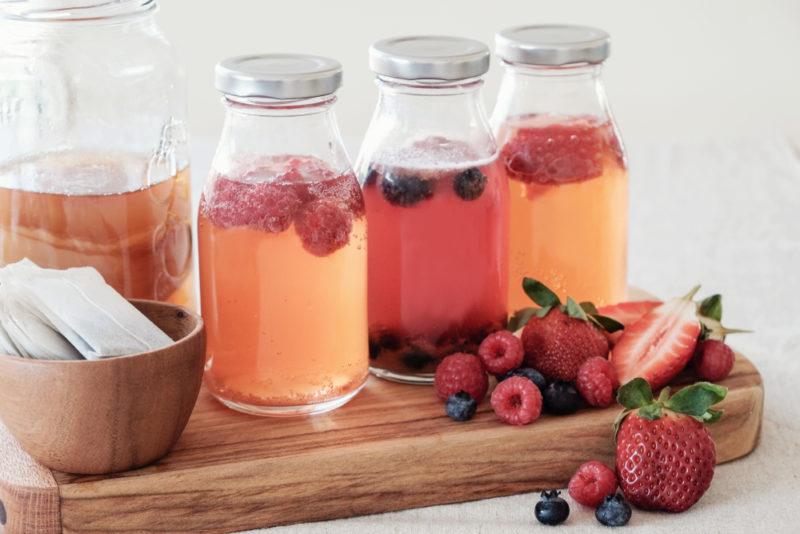
Kombucha Can Be Contaminated
Contamination is the biggest issue with kombucha, especially if you’re making it at home. After all, the whole goal of kombucha is to encourage the growth of healthy bacteria. It’s easy to see how you could end up growing unhealthy or even dangerous bacteria at the same time.
Contamination is mostly easy to spot, as the flavor or smell of your kombucha will be a little ‘off’. But, this isn’t always the case. Some types of contamination are largely invisible. You won’t know there’s a problem until you start seeing side effects.
Kombucha contamination has even been linked to illness or death in a few cases. Thankfully, most contamination is likely to just make you feel a little sick, rather than having a severe effect.
If you’re healthy and are only having a glass or two of kombucha every now and again, the contamination shouldn’t be a serious problem. Caution is needed if you have a compromised immune system or if you’re drinking large amounts of kombucha regularly.
The Alcohol Content
Commercial kombucha generally contains less than 0.5% alcohol, which is low enough for it to be considered alcohol-free. Homemade kombucha, on the other hand, might contain around 3% alcohol or perhaps a little more.
This isn’t a large amount of alcohol, but could be a problem if you’re trying to avoid alcohol entirely.
There Might Be Too Much Sugar
Kombucha is naturally low in sugar because most of the sugar you initially add is used as fuel for the fermentation process. But, some companies that produce kombucha add extra sugar to give you a sweeter drink.
While a little extra sugar might be appealing some of the time, giving you a delicious flavor profile, too much sugar won’t help at all. As such, it’s important to pay careful attention to the product label or recipe for kombucha, to be certain you end up with a healthy drink.
The sugar content can be tricky with homemade kombucha too, as it’s hard to be sure how much of the initial sugar was used in fermentation and how much remains. This means you can’t always tell how much sugar you’re consuming in a serving.
There Can Be Side Effects
Kombucha can cause side effects too, even when it isn’t contaminated. Possible reactions include a stomachache, nausea, or a headache. Some people even experience ketoacidosis, which means there is too much acid in their blood.
Side effects vary from one person to the next, so you’ll need to pay attention to your own responses.
Be particularly careful if you have any health condition or a compromised immune system. Such problems can make you more vulnerable.
It Can Harm Your Teeth
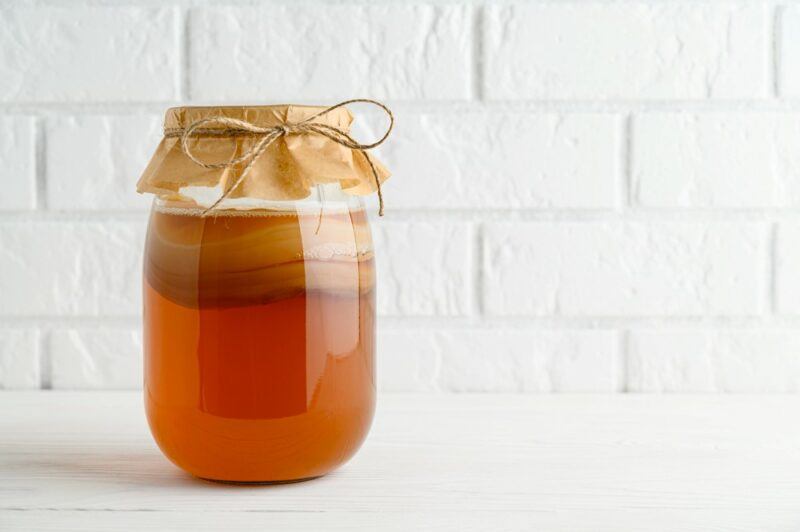
Kombucha is highly acidic, which makes it a poor choice for your teeth. It can easily damage your tooth enamel and increase your risk of cavities. This effect is partly why soda is so bad for your teeth as well.
Thankfully, there are some solutions. The first is to drink it in one sitting. Don’t keep a glass or a bottle of kombucha next to you and sip it throughout the day. You can also drink kombucha through a straw. If you position this behind your teeth, you minimize their exposure to the acid.
Also, when you’ve finished your kombucha, swish your mouth out with plain water. This helps to neutralize any acidity in your mouth, lowering the risk of ongoing problems.
Don’t brush your teeth though. Doing so is harmful rather than helpful, as the acid from kombucha weakens tooth enamel, while brushing right after increase the risk of losing that enamel.
How To Choose The Best Kombucha
Here’s a critical fact – kombucha isn’t all the same. There are countless differences between products, including the type of tea used, other ingredients that are added, the fermentation time, and the SCOBY.
SCOBY stands for symbiotic culture of bacteria and yeast. The bacteria and yeast in the SCOBY are responsible for fermentation, making the SCOBY an essential part of kombucha production.
But, SCOBYs aren’t all the same. They can include an array of different bacterial and yeast species. Each of these can have its own impacts on gut health.
Some of the differences between kombucha products don’t matter too much, like the flavor or even the specific bacterial species that are used. You can simply choose whatever product you like the best.
Still, if you’re buying kombucha, look for a high-quality brand. Be sure to check the ingredients label too. Some brands add sugar or flavoring agents. These might make the kombucha taste better, but they also create a less healthy drink.
Some commercial products are even pasteurized. This reduces any health risks dramatically, but pasteurization kills all bacteria – good and bad. Pasteurized kombucha won’t give you the probiotic benefits you get with regular kombucha (which largely defeats the purpose).
If you’re making the drink at home, be sure to clean everything well and follow good processes. This way you’re reducing the risk of contamination and any side effects from the kombucha.
How Much Kombucha Should You Drink?
Official recommendations from the Centers for Disease Control suggest you can drink up to four ounces of kombucha between one and three times per day. In other words, no more than 12 ounces of kombucha per day.
It’s easy to go above this intake, as some commercial kombucha products are 16 ounces.
However, probiotics like kombucha haven’t been heavily researched. We don’t know much about the ideal intake for getting the most benefits and minimizing risks. Some people might easily be able to have more.
Regardless of whether you drink more than 12 ounces of kombucha a day or not, you should always pay attention to your body. Look for any signs of a problem, like headaches or nausea. If you regularly get side effects from kombucha, then it may not be the right drink for you.
How To Make Kombucha At Home
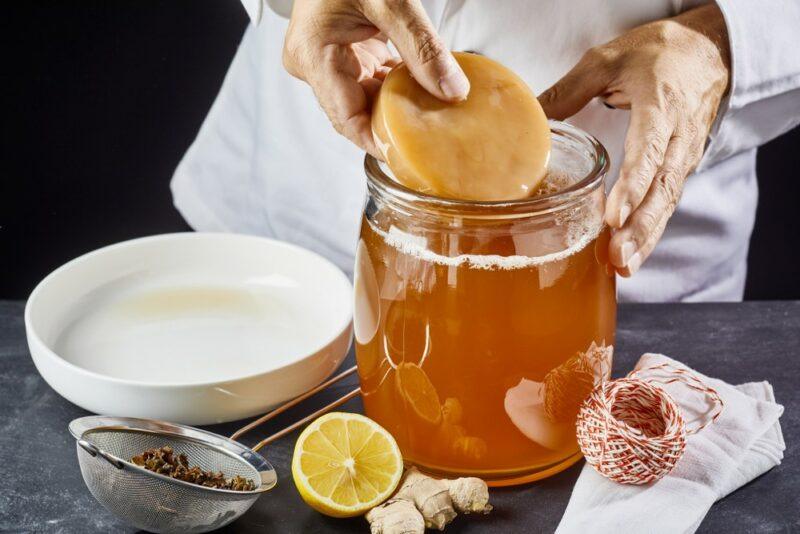
While kombucha takes time to make, the steps involved are surprisingly simple. There are three key steps: Making the SCOBY, the first fermentation (which creates the kombucha itself), and the second fermentation (which carbonates it).
To make a SCOBY yourself, you need unpasteurized store bought kombucha, along with tea, water, and sugar. This article from Live Eat Learn provides details about making the SCOBY, followed by information about the first and second fermentation.
You might be able to skip the SCOBY making step if you can find someone who makes kombucha regularly. You may then be able to use some of their SCOBY to seed your own, making the whole process faster.
Beyond this, here are some important tips to keep your kombucha safe.
- Don’t ferment in any type of ceramicware. Lead can leach from the glaze of your ceramic and end up in the kombucha. Avoid plastic and mental too. Ferment in glass instead, preferably in a vessel that’s designed for beer or wine fermentation.
- Watch the fermentation time. Kombucha is typically fermented for a week or so. Some people end up leaving the kombucha for longer, perhaps because they forget, which increases the risk of health problems.
- Make sure that all your equipment is clean (your hands too). Doing so decreases the risk of contamination and should give you a much healthier drink.
- Steep the tea in very hot water – ideally more than 165˚F. This is higher than you’d normally use for tea, particularly green tea, but the high temperature gives you a better result.
- Use ample sugar. Sugar acts as food for the bacteria in your kombucha and also keeps the pH low. This second effect is crucial, as it creates an environment that promotes the growth of good bacteria and not of harmful bacteria.
- Contamination is most likely during fermentation, so choose the location carefully. Ideally, the kombucha should be in a warm location with good airflow, but not in direct sunlight. Keep it away from anything else in your kitchen, including plants, to further reduce the risk of contamination.
- Research the sweetener that you plan to use. Sugar is an easy go-to, while options like maple syrup and honey can work too. However, some sweeteners don’t promote the right bacteria and are much less effective (molasses is one of these).
- If you spot any mold, toss the entire batch out and start again.
Final Thoughts
Kombucha is often a low calorie drink that contains probiotics, may promote your gut health, and can be easily made at home. The biggest problems come from the risk of contamination. Still, you can avoid contamination easily enough by purchasing kombucha from a reliable brand or by being careful when you make the drink yourself.
Besides, the risk of bacterial contamination isn’t unusual. You need to take care when working with raw meat too, for the same reason.
It’s also true that the benefits of kombucha haven’t all been proven in humans. Some are mostly theory-based, while others have been shown in animals rather than people.
For example, we know that gut bacteria are important for human health and that probiotics can influence the balance of gut bacteria and improve health. Research hasn’t linked kombucha specifically to many of these benefits, but kombucha is a source of probiotics, so the drink is likely to help.
Still, this doesn’t really matter. In the end, if kombucha is well-prepared, then the risks are low and the potential for benefits is high. Even if some of the benefits don’t occur in humans, you still end up with a delicious natural drink that isn’t highly processed.
Frequently Asked Questions
What Is Raw Kombucha?
You may see the term raw kombucha used on some products. This simply means that the kombucha hasn’t been heated or pasteurized in any way. This is helpful, as heating the kombucha risks killing the beneficial bacteria and could decrease the health benefits of the drink.
Some companies may pasteurize their kombucha and then re-add healthy bacteria afterwards (a similar practice is sometimes used for yogurt). This approach should give you probiotic benefits from the kombucha. However, raw kombucha may still be the ideal choice.
Can You Drink Too Much Kombucha?
Despite the benefits of kombucha, you can certainly drink too much of it. For some people, drinking more than 12 ounces per day is enough to cause GI issues and raises the risk of a condition called lactic acidosis.
You might be able to consume more than this safely, but it’s important to be careful and pay attention to how your body responds.
Be particularly wary if you’re drinking a bottle of kombucha every day. Studies on kombucha are still ongoing and there may be long-term side effects that we don’t know about.
Is Kombucha Alcoholic?
Fermented food naturally contains some alcohol, however it’s not normally brewed to be alcoholic. Because of this, most products contain less than 0.5% alcohol and are sold as being alcohol free.
Homemade kombucha generally ranges from around 1% to 2.5%, depending on how it is brewed and other factors.
There are exceptions though. Some companies brew their kombucha to have a higher alcohol percentage, so it can be enjoyed in the same way as beer. Such products should be clearly labeled and you’re unlikely to stumble into one by mistake.
Is Kombucha Caffeinated?
Kombucha is made from tea leaves, which naturally contain caffeine. This means there’s some caffeine in kombucha itself.
However, the caffeine content is extremely low, much lower than in a cup of coffee or even tea. You’re often just getting somewhere between 10 and 20 mg of caffeine per serving, while tea often contains around 45 mg of caffeine and coffee is higher still.
The caffeine content is low enough that even people who are sensitive to caffeine mightn’t notice any effect from kombucha at all.
You can theoretically make kombucha without tea at all, like using a different type of liquid entirely or using herbal tea instead of real tea. Doing so should give you a caffeine free drink.
Is Kombucha Good For IBS?
Kombucha is generally bad news for IBS, as it’s high in FODMAPs and can make IBS symptoms much worse. Some of this effect is due to ingredients like added sweeteners.
However, even the probiotics in kombucha can be harmful for IBS, as they could promote bacterial overgrowth.
That said, some people find that kombucha actually helps with their IBS by helping to rebalance their gut bacteria and start to heal their gut. If you’re going to try this route, it’s best to go cautiously. This way you can detect any side effects early on.




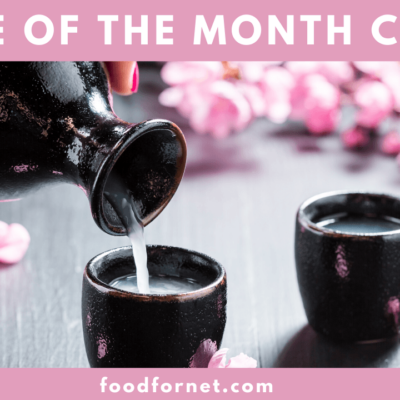
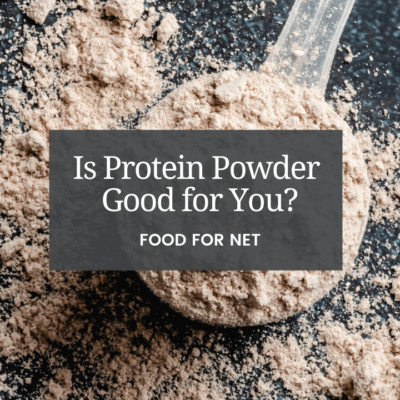



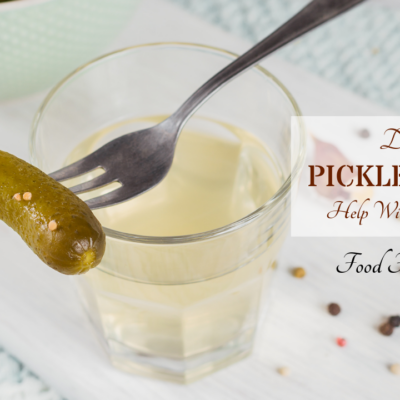




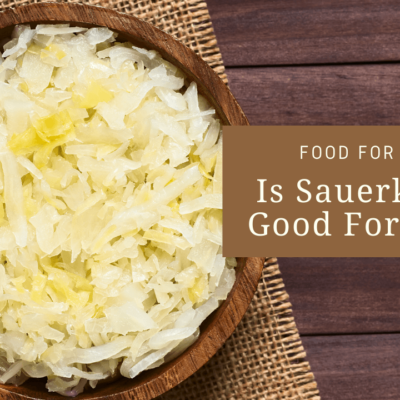


 Delightful Orange Juice Cocktails
Delightful Orange Juice Cocktails
Leave a Reply